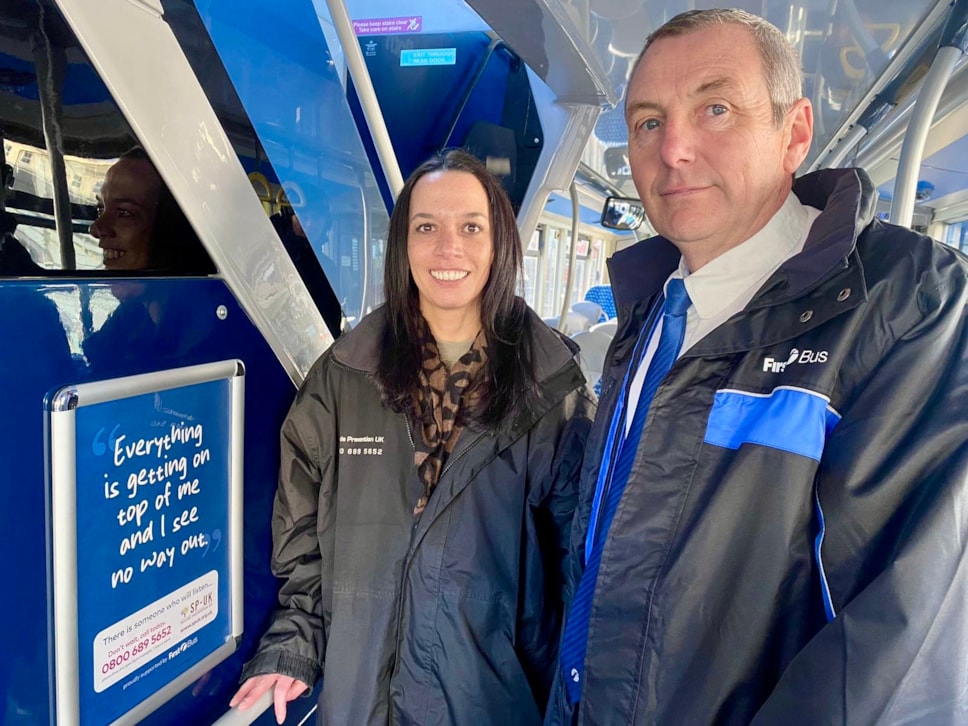
Bus passenger suicide calls “increased significantly” as partnership nominated for national award
The number of bus passengers calling a suicide prevention charity for help has “increased significantly” since the launch of a ground-breaking partnership with the west of England’s largest bus operator.
Suicide Prevention UK (SPUK), which is based in Bristol but offers a national helpline, says since its new project with First West of England launched in January - aimed at spotting the signs of suicide among passengers - an increasing number of callers mention buses when phoning for help.
The news comes on World Suicide Prevention Day (10th September) as the bus operator also reveals that hundreds of new bus drivers have received suicide prevention guidance as part of the link-up, which is thought to be the first of its kind in the UK.
In further good news for the partnership, it has also been nominated for a top accolade in the Best Alliance/Collaboration of the Year category at the prestigious National Transport Awards, taking place in London next month. It will compete against other high-profile partnerships across the country.
SPUK, which offers volunteer patrols across some of the West of England’s high risk suicide spots, launched the partnership with First West of England after it revealed that about 3 in 50 (about 6%) of those found at risk of suicide said they had taken public transport to the location where they planned to take their life, but that number could be much higher. Its research also shows that figure has increased over recent years, suggesting more people are using buses and public transport to get to their locations.
Since the partnership launched, the charity has received dozens of calls from people in need of help from all over the country, all of whom have mentioned buses in their calls, from locations such as Belfast, Sheffield, Edinburgh, Manchester and London, alongside dozens from across the West of England region.
A big part of the partnership has been the creation of a new advice booklet and guidance for bus drivers to provide insight into how they can spot the physical and visual signs of someone who may be contemplating suicide and to identify high risk suicide locations on bus routes such as bridges, open water and isolated areas. Over the past eight months since its launch, more than 400 bus drivers have received the guidance sessions including about 350 new ones entering the industry.
Alongside the guidance for drivers, the partnership also includes an on-board poster campaign, featuring real-life quotes from those who have contemplated suicide with an audience of about 1.5million passengers each week. The posters are designed to help drivers and other passengers spot the signs of potential suicide and signpost those who need help.
More than 100 travel passes have also been given to SPUK’s volunteer patrol team, allowing them to travel for free while on duty across the West of England.
Marianne Ramnath, from Suicide Prevention UK, said: “When the partnership was launched we received some really heartfelt messages through our social media channels. Many were from loved ones who had lost friends and relatives to suicide who had used the bus to get to – tragically - their final destination.
“Since the partnership launched in January there has been so much more mention of buses from people contacting us. It’s sad in some respect that there are so many individuals in crisis who use the buses, but I feel the significant increase in the link between suicide and buses has been down to our incredible partnership, where passengers can visibly see our charity’s details and reach out for support.
“Alongside raising awareness among drivers of potentially suicidal passengers, the aim of the partnership was to provide help and support to bus users, and its brilliant that more of them feel it’s OK to reach out.”
Neely Good, First West of England’s Training and Recruitment Officer, who has been leading the suicide prevention guidance for the bus operator, said: “The new guidance has been really well received, and, at times, has sparked some really interesting debate about how it can be used in the real world.
“Our drivers come into contact with thousands of customers every day, from all walks of life, and among them will be people who are contending with their own worries and troubles, so it’s really important that we arm drivers with information that allows them to signpost help if they spot any of the signs.
“As a bus operator we’re at the heart of society, so it’s really important that we can play our part in helping those around us in need.”
Notes to editors
Picture caption: Marianne Ramnath from Suicide Partnership UK with Colin Partridge from First West of England launched the suicide prevention partnership earlier this year.
